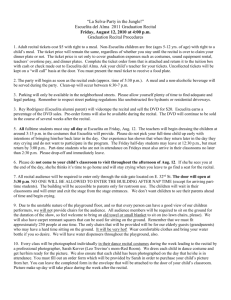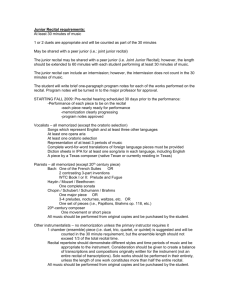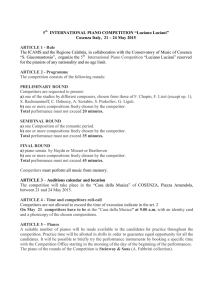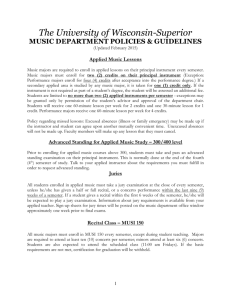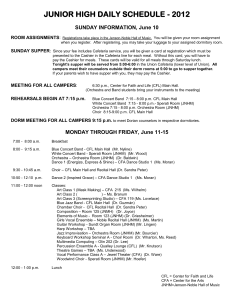Recital Guidelines - the Benjamin T. Rome School of Music!
advertisement
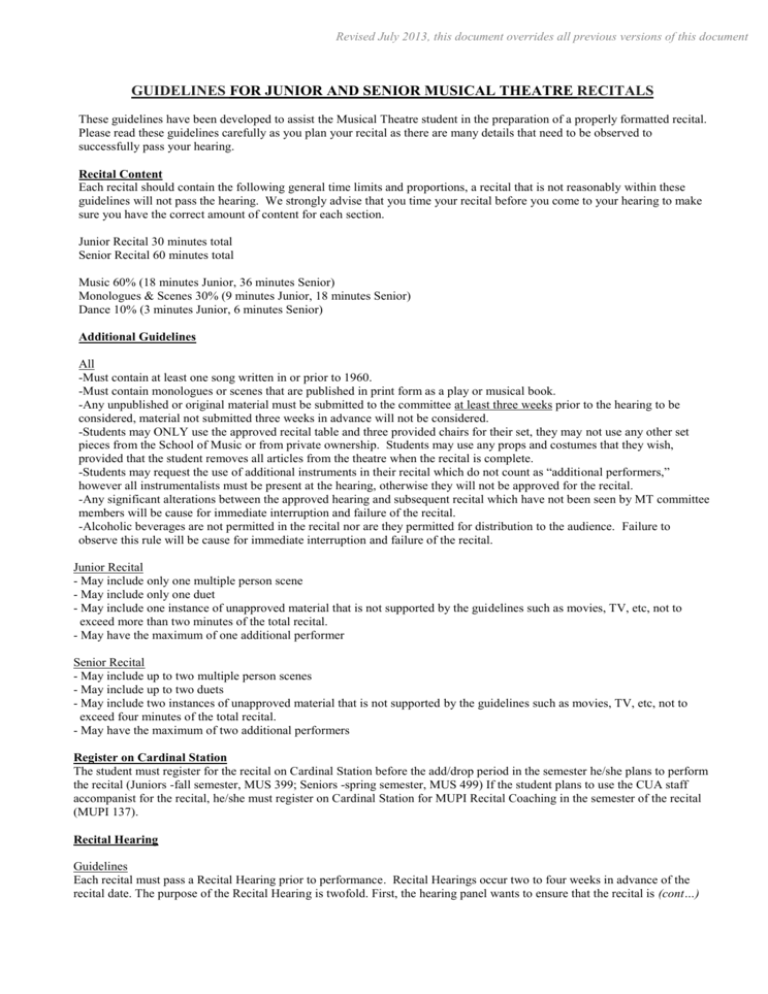
Revised July 2013, this document overrides all previous versions of this document GUIDELINES FOR JUNIOR AND SENIOR MUSICAL THEATRE RECITALS These guidelines have been developed to assist the Musical Theatre student in the preparation of a properly formatted recital. Please read these guidelines carefully as you plan your recital as there are many details that need to be observed to successfully pass your hearing. Recital Content Each recital should contain the following general time limits and proportions, a recital that is not reasonably within these guidelines will not pass the hearing. We strongly advise that you time your recital before you come to your hearing to make sure you have the correct amount of content for each section. Junior Recital 30 minutes total Senior Recital 60 minutes total Music 60% (18 minutes Junior, 36 minutes Senior) Monologues & Scenes 30% (9 minutes Junior, 18 minutes Senior) Dance 10% (3 minutes Junior, 6 minutes Senior) Additional Guidelines All -Must contain at least one song written in or prior to 1960. -Must contain monologues or scenes that are published in print form as a play or musical book. -Any unpublished or original material must be submitted to the committee at least three weeks prior to the hearing to be considered, material not submitted three weeks in advance will not be considered. -Students may ONLY use the approved recital table and three provided chairs for their set, they may not use any other set pieces from the School of Music or from private ownership. Students may use any props and costumes that they wish, provided that the student removes all articles from the theatre when the recital is complete. -Students may request the use of additional instruments in their recital which do not count as “additional performers,” however all instrumentalists must be present at the hearing, otherwise they will not be approved for the recital. -Any significant alterations between the approved hearing and subsequent recital which have not been seen by MT committee members will be cause for immediate interruption and failure of the recital. -Alcoholic beverages are not permitted in the recital nor are they permitted for distribution to the audience. Failure to observe this rule will be cause for immediate interruption and failure of the recital. Junior Recital - May include only one multiple person scene - May include only one duet - May include one instance of unapproved material that is not supported by the guidelines such as movies, TV, etc, not to exceed more than two minutes of the total recital. - May have the maximum of one additional performer Senior Recital - May include up to two multiple person scenes - May include up to two duets - May include two instances of unapproved material that is not supported by the guidelines such as movies, TV, etc, not to exceed four minutes of the total recital. - May have the maximum of two additional performers Register on Cardinal Station The student must register for the recital on Cardinal Station before the add/drop period in the semester he/she plans to perform the recital (Juniors -fall semester, MUS 399; Seniors -spring semester, MUS 499) If the student plans to use the CUA staff accompanist for the recital, he/she must register on Cardinal Station for MUPI Recital Coaching in the semester of the recital (MUPI 137). Recital Hearing Guidelines Each recital must pass a Recital Hearing prior to performance. Recital Hearings occur two to four weeks in advance of the recital date. The purpose of the Recital Hearing is twofold. First, the hearing panel wants to ensure that the recital is (cont…) well prepared to reflect the student's own talents as well as the quality expected by the MT Division. Secondly, in giving the student an early target date for performing the Recital Hearing, the student is able to use the subsequent time to hone and finetune the recital on a deeper level. The panel on the Recital Hearing not only passes or fails the student, but also coaches him/her and offers suggestions to improve the recital. The student then has at least two more weeks to contemplate the suggestions and make decisions and improvements. If the student fails his/her hearing it is the student’s responsibility alone to coordinate a make-up hearing with the faculty. What to bring to the Hearing 1) The Hearing Form -available from the Music Office 2) Dramatic Text Sources - Although the student will have already submitted any unpublished monologues to the committee, he/she must also bring one copy of ALL source material to the hearing. 3) Hearing Program - Three copies of the program with ample space between each song and scene for the panel to write comments 4) Official Recital Program - One copy of the program that the student is planning to submit as the actual handout at the recital. This includes all songs, monologues, scenes, dance numbers with exact titles, composers, and lyricists, and recital personnel including accompanists, choreographers, lighting designer, stage manager, and anyone else involved in the recital. It is the student's responsibility to check that all credits are spelled correctly. -Failure to produce any of these items before the hearing will result in the student being ineligible to pass the hearing Performing for the Hearing The recital will be performed in full at the hearing. Every recital hearing must be in a finished and rehearsed state with all costumes, props, and personnel. Dances must be finished and ready with the proper shoes, clothing and music. The lighting and staging must be worked out so that the student is able to make the actual transitions and announce the lighting cues, i.e. "Black out here, Lights up here," etc. Recital clothing should be worn and all costume changes (if any) need to be seen at the hearing. If any elements are missing, the student runs the risk of failing the recital and having to reschedule it for a different date. You must have all personnel who will be seen/heard in your recital at your hearing. A hearing will not be passed as presented if the performing personnel are not present. Assigned Dates for Recital, Hearing, and Dress Rehearsal To confirm a recital date, a $55 fee is paid to the Production Office. When the student signs up with the Production Office for the recital date, he/she will be given a date for the hearing and dress rehearsal as well. It is the student's responsibility to make sure that all people involved in the recital are available for these dates. These dates cannot be changed due to lack of preparation. If these dates must be changed due to an emergency or illness, the recital date may have to be postponed, and it is the STUDENT'S responsibility to reschedule the hearing. Submission of the Program After the student has passed the recital hearing and the program has been approved by the hearing panel, it is the responsibility of the student to submit the program to the Production Office. It should be saved as a "Word" document and emailed to the production office (traino@cua.edu) with "MT recital program for (your name)" in the subject line. School of Music Building Guidelines for Recital Rehearsals and Performances -All rehearsals in the recital hall and JPH must be approved by the Production Office. -Ward 210 (old chorus room) is not available for rehearsal without the presence of a faculty member AND permission from the Production Office. -A portable Sound system will be provided for the recital. -After completion of recital, participant is responsible for cleaning up of all personal belongings and restoring stage to a state of neutral for the next student's recital. Receptions -Three (3) tables will be provided in the lower lobby for receptions. The student is not to borrow tables from other areas in the building. -At the completion of the reception, it is the student’s responsibility to take all garbage to the dumpster located just outside of the back exit door near the vending machines. -NO ALCOHOL IS PERMITTED. The Musical Theatre Division hopes that these guidelines will help in the planning of the recital and eliminate the stress of last minute performance preparation. If the student prepares well for the recital hearing, the performance of the recital will be much more meaningful to both the student and the audience. The goal is to make the recital a joyous celebration of the student's accomplishments in Musical Theatre.
